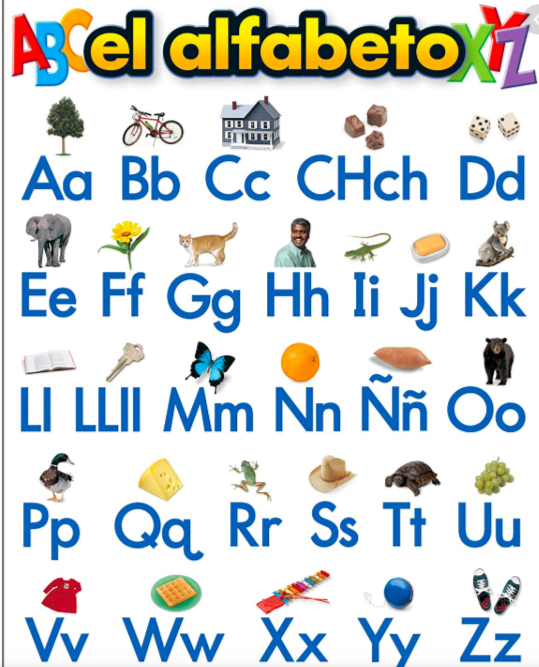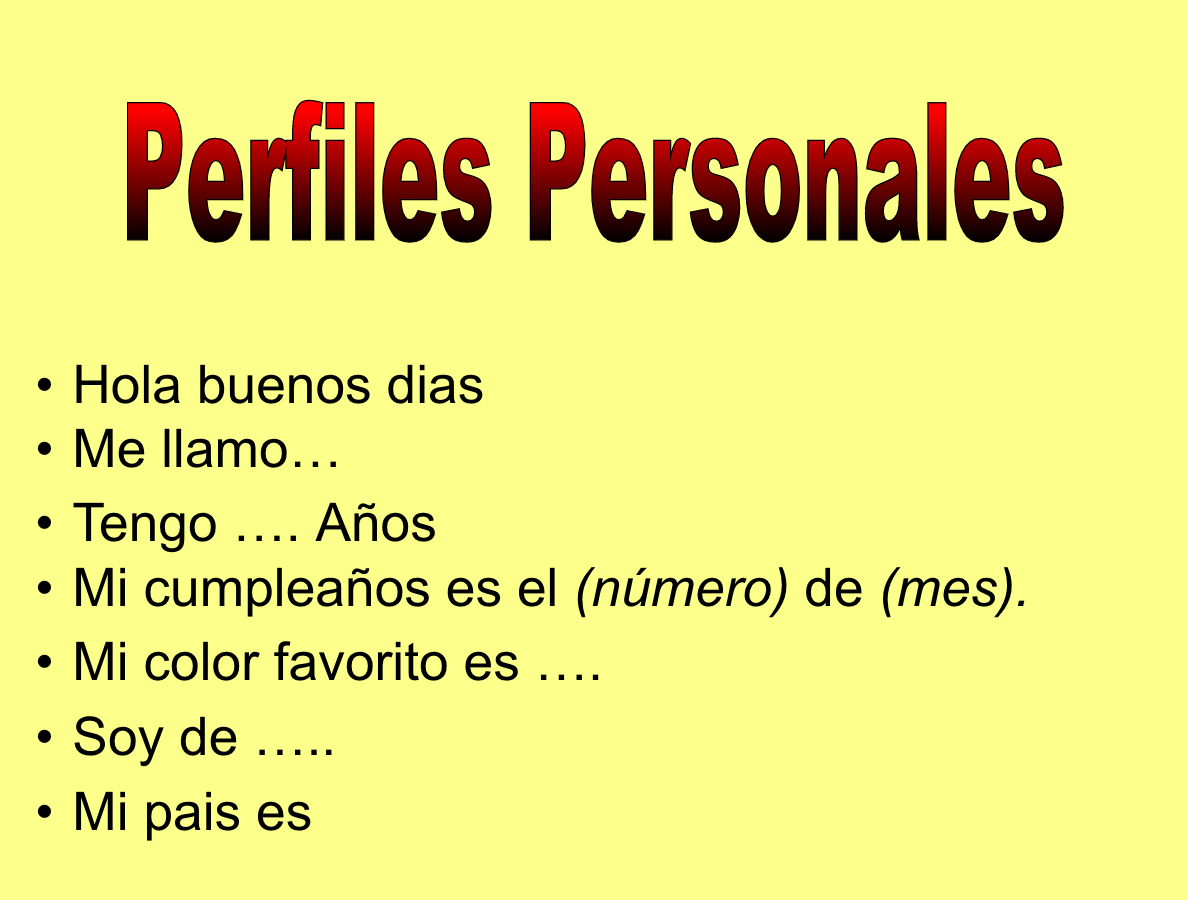8 Spanish
Section outline
-
Bienvenidos a la clase de español/Welcome to the Spanish class.
Today topics:
- What Spanish is all about
- Greetings
In our first class, I will introduce myself to the class and we will look at what Spanish is all about.
Also in today's class also we will learn and practice how to greet and farewell people.
Big Idea: Introduction
Learning Intentions: We are learning to (WALT)...
- Outline the expectation for Spanish
- Provide an opportunity to Ms Martin to know how much Spanish the students know.
- Show the students typical things of Spain
- Recognise and respond to greetings
- Greet and farewell people
AO Coverage:
Selecting and using language, symbols, and texts to communicate
Recognise that the target language is organised in particular ways.
Recognise that the target culture(s) is (are) organised in particular ways.
Success Criteria: I can/have...
- I understand the course outline for Spanish 2020
- Completed the activity how to great people
Activities:
Do you know any Spanish already? With your group brainstorm all the Spanish you can think of meanings/movies/restaurant/food/celebrities
Make this in an A3 colour paper, DON'T USE INTERNET PLEASE FOR THIS ACTIVITY
What do you hope to learn this year?
-
This week.....
- Greetings

Also in today's class also we will learn and practice how to greet and farewell people.
Big Idea: Introduction, who are you?
Learning Intentions: We are learning to (WALT)...
- Recognise and respond to greetings
- Greet and farewell people
- Say your name
- To be able to greet someone in Spanish
- to ask how someone understands their response.
AO Coverage:
Selecting and using language, symbols, and texts to communicate
Recognise that the target language is organised in particular ways.
Recognise that the target culture(s) is (are) organised in particular ways.
Success Criteria: I can/have...
- I understand the course outline for Spanish 2020
- Completed the activity how to great people
Activities:
1. Roleplay
2. Quiz
3. Unscrambled
-
Hola, Buenos Dias Y8 Spanish!
Learning Intention:
We are learning to learn the Spanish alphabet
Success Criteria:
Recognise and respond to greetings Identify and respond to letters of the alphabet
Identify the sounds of the Spanish alphabet with the letters
Spell correctly Spanish words Create my own Spanish alphabet La cancion del alfabetoEL ALFABETO


Hola chicos y chicas, in today's class, will continue with the Spanish Alphabet and we will reinforce the Spanish sounds and how well you identified the sound with the letter. Also, you will create your own Spanish alphabet.
Remeber to use these websites for you to practise at home:
http://www.spanishspanish.com/alfabeto_ipower.html
Don Quijote website (www.donquijote.org/spanishlanguage/alphabet) and learn vocabulary list
Activities:
- Answer the roll in Spanish
- Practice the sounds of the alphabet
- Competition game with the whiteboards
- Create your own alphabet
-
 Due to swimming competition in today's class, we will work in Language perfect for the first time.
Due to swimming competition in today's class, we will work in Language perfect for the first time.Go to Unit 1: Greetings and Introductions
-
Learning Intention:
We are learning to learn the Spanish alphabet
Success Criteria:
Recognise and respond to greetings Identify and respond to letters of the alphabet
Identify the sounds of the Spanish alphabet with the letters
Spell correctly Spanish words Create my own Spanish alphabet La cancion del alfabetoEL ALFABETO


Hola chicos y chicas, in today's class, will continue with the Spanish Alphabet and we will reinforce the Spanish sounds and how well you identified the sound with the letter. Also, you will create your own Spanish alphabet.
Remember to use these websites for you to practise at home:
http://www.spanishspanish.com/alfabeto_ipower.html
Don Quijote website (www.donquijote.org/spanishlanguage/alphabet) and learn vocabulary list
Activities:
- Answer the roll in Spanish
- Practice the sounds of the alphabet
- Competition game with the whiteboards
- Create your own alphabet
-
YOUR OWN ALFABETO

In selected linguistic and sociocultural contexts, students will: For this example, students might:
WITH THIS ACTIVITY
- receive and produce information;
- use simple (one-clause or one-phrase) sentences and everyday vocabulary
- produce and respond to questions and requests;
- notice that questions in Spanish can be made with simple inflexion in oral form;
- show social awareness when interacting with others;
- communicate information appropriately through their poster;
- recognise that Spanish is organised in particular ways;
- recognise and use the formulaic expressions se deletrea and llámame as language models;
- make connections with their own language(s);
- recognise that Hispanic cultures are organised in particular ways;
- learn written punctuation of inverted ! and ? marks;
- make connections with known culture(s).
-
Student understanding and awareness of the unique culture of a Spanish-speaking country
Criteria
Working Towards
Achieved
Merit
Excellence
Information
You have included information that is mostly irrelevant or not in your own words
You have included some information that is relevant to your chosen Spanish speaking country project
You have included information, with some supporting examples, that is relevant Spanish speaking country project
You have included detailed information, with supporting examples, that is all relevant Spanish speaking country project
Visuals
You have made limited use of visuals to communicate your understanding of Spanish speaking country project
You have used some visuals to communicate your understanding of your chosen Spanish speaking country project
You have used visuals to communicate your understanding of your Spanish speaking country project
You have effectively used visuals to communicate your understanding of your Spanish speaking country project
Presentation
You have yet to try to make it engaging to the class
You have attempted to make it engaging to the class
You have overall made it engaging in the class
You have successfully made it engaging in the class
Time Management
You have not submitted evidence of your assessment by the due date:
You have not submitted evidence of your assessment by the due date:
You submitted evidence of your assessment by the due date:
You submitted evidence of your assessment by the due date:
-
Please Upload your assessment 1, Spanish speaking country culture project.

